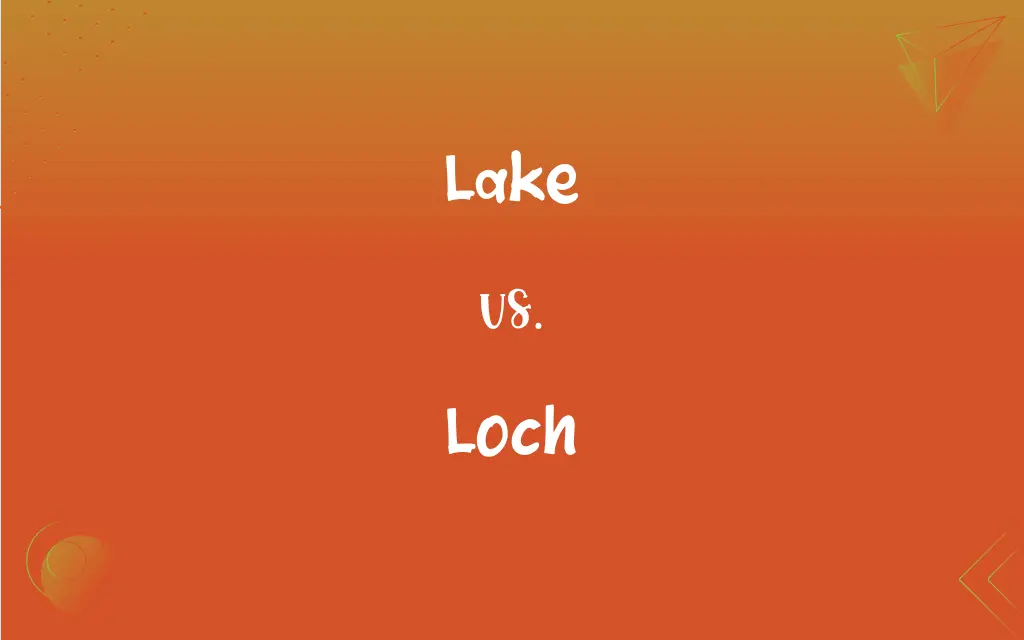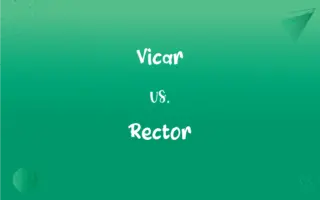Lake vs. Loch: What's the Difference?
Edited by Harlon Moss || By Janet White || Updated on October 19, 2023
"A lake is a large body of water surrounded by land, while a loch is the Scottish term for 'lake' or 'fiord,' specifically used in Scotland."

Key Differences
A "Lake" is commonly understood in English-speaking countries as a considerable inland body of standing water. In contrast, the term "Loch" is traditional in Scotland and refers to a body of water that might be a lake, sea inlet, or fiord. Both terms indicate significant accumulations of water, but "loch" carries a cultural and regional nuance.
In terms of geographical distribution, "Lakes" can be found worldwide and are known by this term in many English-speaking regions. However, "Lochs" are specific to Scotland, and while they are essentially lakes or fiords, the distinct terminology reflects the influence of the Scottish Gaelic language. The term "lake" is general, whereas "loch" is geographically specific.
Regarding physical characteristics, a "Lake" is typically a freshwater body, though some saltwater lakes exist, surrounded by land and not part of an ocean. Alternatively, a "Loch" can be either freshwater, like Loch Lomond, or a sea loch, which is saltwater and similar to a fiord, like Loch Long. The terminology encompasses a broader range of water body types.
In linguistic terms, "Lake" is a word of Germanic origin, coming from Old English "lacu," meaning a pond or pool. "Loch" derives from the Scottish Gaelic "loch," meaning a lake or fiord. Although both words designate places where water is accumulated, the origin of "loch" reflects Scotland's unique linguistic and cultural heritage.
From a tourism perspective, "Lakes" are popular destinations worldwide, known for recreational activities like boating, fishing, or swimming. "Lochs," however, often contribute to Scotland's mystique, partly due to the famous legend of the Loch Ness Monster. Both "lakes" and "lochs" attract tourists, but lochs have a particular cultural and mythological significance to Scotland.
ADVERTISEMENT
Comparison Chart
Meaning
A large inland body of water
Scottish term for a lake or fiord
Geographical Use
Used worldwide
Specifically used in Scotland
Water Type
Usually freshwater, some saltwater
Can be freshwater or saltwater (sea loch)
Linguistic Origin
Old English "lacu"
Scottish Gaelic "loch"
Cultural Significance
Recreational sites
Associated with Scottish identity, folklore
ADVERTISEMENT
Lake and Loch Definitions
Lake
A significant, landlocked water reservoir.
The city's water supply comes from a nearby lake.
Loch
A term used for lakes and fiords in Scotland.
The tour included several lochs known for their natural beauty.
Lake
A natural inland water pool.
The lake provides habitat for many bird species.
Loch
A body of water in Scotland, often with cultural significance.
The loch we visited was the site of an ancient battle.
Lake
An extensive area filled with still water.
After the rain, a temporary lake formed in the hollow.
Loch
A Scottish geographical term for a significant water feature.
We could see the loch's surface shimmering in the moonlight.
Lake
A large body of water surrounded by land.
We spent the weekend camping by the lake.
Loch
A Scottish body of water, either a lake or sea inlet.
They visited a famous loch in the Scottish Highlands.
Lake
A landscape feature with recreational value.
Every summer, we go swimming in the lake.
Loch
A deep, narrow lake in Scotland.
Legends of monsters often surround these mysterious lochs.
Lake
A large inland body of fresh water or salt water.
Loch
A lake.
Lake
A scenic pond, as in a park.
Loch
An arm of the sea similar to a fjord.
Lake
A large pool of liquid
A lake of spilled coffee on my desk.
Loch
A lake.
Lake
A pigment consisting of organic coloring matter with an inorganic, usually metallic base or carrier, used in dyes, inks, and paints.
Loch
A bay or arm of the sea.
Lake
A deep red.
Loch
Alternative form of lohoch
Lake
A large, landlocked stretch of water or similar liquid.
Loch
A lake; a bay or arm of the sea.
Lake
A large amount of liquid; as, a wine lake.
Loch
A kind of medicine to be taken by licking with the tongue; a lambative; a lincture.
Lake
A small stream of running water; a channel for water; a drain.
Loch
A long narrow inlet of the sea in Scotland (especially when it is nearly landlocked)
Lake
(obsolete) A pit, or ditch.
Loch
Scottish word for a lake
Lake
(obsolete) An offering, sacrifice, gift.
Lake
(dialectal) Play; sport; game; fun; glee.
Lake
(obsolete) A kind of fine, white linen.
Lake
In dyeing and painting, an often fugitive crimson or vermillion pigment derived from an organic colorant (cochineal or madder, for example) and an inorganic, generally metallic mordant.
Lake
In the composition of colors for use in products intended for human consumption, made by extending on a substratum of alumina, a salt prepared from one of the certified water-soluble straight colors.
The name of a lake prepared by extending the aluminum salt prepared from FD&C Blue No. 1 upon the substratum would be FD&C Blue No. 1--Aluminum Lake.
Lake
(obsolete) To present an offering.
Lake
To leap, jump, exert oneself, play.
Lake
To make lake-red.
Lake
A pigment formed by combining some coloring matter, usually by precipitation, with a metallic oxide or earth, esp. with aluminium hydrate; as, madder lake; Florentine lake; yellow lake, etc.
Lake
A kind of fine white linen, formerly in use.
Lake
A large body of water contained in a depression of the earth's surface, and supplied from the drainage of a more or less extended area.
Lake
To play; to sport.
Lake
A body of (usually fresh) water surrounded by land
Lake
A purplish red pigment prepared from lac or cochineal
Lake
Any of numerous bright translucent organic pigments
FAQs
Are all lochs in Scotland?
The term "loch" is specific to Scotland, though other countries have similar features.
Is a loch different from a lake?
"Loch" is the Scottish term for a lake or fiord, so it's a type of lake.
Can lakes be man-made?
Yes, lakes can be natural or man-made (reservoirs).
Are all lakes freshwater?
No, lakes can be either freshwater or saltwater.
Are lochs freshwater or saltwater?
Lochs can be either, depending on their connection to the sea or isolation inland.
Can you swim in all lakes?
Most lakes are safe for swimming, but local conditions or regulations might restrict it.
How do lakes form?
Lakes can form through glacial activity, tectonic movements, or volcanic activity, among other processes.
Why are lochs central to Scottish folklore?
Lochs, particularly Loch Ness, are associated with legendary creatures and stories.
Do lakes have ecosystems?
Yes, lakes support diverse plant and animal life.
What's the most famous loch in Scotland?
Loch Ness is the most famous due to the legend of the Loch Ness Monster.
Can a loch be part of the sea?
Yes, sea lochs are saltwater inlets connected to the sea.
Are there saltwater lakes?
Yes, some lakes are saltwater, like the Great Salt Lake in Utah.
How deep can a lake be?
Lake depths vary significantly, with Lake Baikal in Russia being the deepest at over 1,600 meters.
Are there fiords in Scotland?
Yes, sea lochs in Scotland are similar to fiords.
Do lochs have tides?
Sea lochs can experience tidal changes due to their connection to the sea.
Can lakes disappear?
Yes, lakes can dry up due to environmental changes or human activity.
Are lakes only found in certain climates?
Lakes exist in various climates, from arctic regions to deserts.
What causes lake water levels to change?
Factors like climate, precipitation, human activity, and geological changes can affect lake water levels.
Are there islands in lochs?
Yes, some lochs have islands, such as Loch Lomond.
Are lochs important to Scotland's tourism?
Absolutely, lochs are significant attractions due to their natural beauty and cultural lore.
About Author
Written by
Janet WhiteJanet White has been an esteemed writer and blogger for Difference Wiki. Holding a Master's degree in Science and Medical Journalism from the prestigious Boston University, she has consistently demonstrated her expertise and passion for her field. When she's not immersed in her work, Janet relishes her time exercising, delving into a good book, and cherishing moments with friends and family.
Edited by
Harlon MossHarlon is a seasoned quality moderator and accomplished content writer for Difference Wiki. An alumnus of the prestigious University of California, he earned his degree in Computer Science. Leveraging his academic background, Harlon brings a meticulous and informed perspective to his work, ensuring content accuracy and excellence.































































